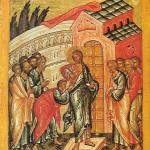
Unlike the format of rocked-out worship songs followed by a lengthy sermon, Catholicism (it is said) has a liturgy, a call-and-response between people and priest. Unlike the marketing ethos that pervades much of evangelicalism, Catholicism is like coming home to what Tolkien might call the ‘Last Homely Home.’ Unlike the cheesy literature that fills Christian bookstores that won’t let Rachel Held Evans use the word ‘vagina,’ Catholicism is the religion of what Hans Urs von Balthasar calls the ‘lay styles,’ the people like Dante, Péguy, and Hopkins who saw the glory of the Lord, got sucked in, and wrote it all down in sublime poetry. Catholicism rocks these evangelical converts’ socks because it’s just everything that they were looking for in evangelicalism but couldn’t find because evangelicalism has become corrupted by the free market and its chief political proponents, the Republican Party and their hard neoliberal equivalents in other countries.
As someone who grew up as a non-denominational evangelical and was confirmed into the Anglican Communion (what those who have jumped the Tiber might call the Americano version of Catholic espresso; I’d like to state for the record, however, that the primate who confirmed me had apostolic succession), I can attest to the feeling that Catholics have something that evangelicals don’t have. Catholic theologian James Alison talks about being blown into the Catholic Church from his evangelical Anglican background by falling in love with a classmate who had a grace that he associated with being Catholic (apparently, as a child, his family had John Stott as a close family friend). I remember living in a Catholic house of studies where the daily mass’s liturgical homily was more Christocentric than I had ever heard at an evangelical church. I also always go back to that time I attended mass at a Catholic church where the cantor led worship from guitar with a full band and took us to sublime heights (he even slipped in a Hillsong piece); incidentally, that day was the first day they used the new rites, and while everyone was sufficiently confused about the ‘and with your spirit’ and ‘under my roof’ lines, my sister described the music as giving her an ‘eargasm’ (Rachel Held Evans would like that). Even before that, I recall first partaking of the Anglican Eucharistic liturgy–which, incidentally, reminded me a lot of Catholic school (as one priest reminded me, you know who stole from whom)–and realizing that the Gospel that evangelicals always tried to articulate in fresh ways was already fully expressed in the liturgy.
Readers of this blog will be tempted to channel everything I say through those personal experiences. Fully aware of positionality issues, however, I’d like to state for the record that they are not what I mean by the Catholic thing, that is, the central theme that some readers have identified in my contributions to this blog: everybody seems to be a closet Catholic. In other words, however readers may assess the motives behind my Catholic gymnastics, I am categorically not trying to impose my own aesthetic fetishes on other brothers and sisters in Christ.
That said, the readers of this blog should not be blamed for thinking that I engage in frequent psychological imposition. This is really my fault, my own grievous fault: I confess to Almighty God, and to you, my brothers and sisters, that I have committed a great sin of omission, for I have failed to define two very key terms. They are Protestant and Catholic. While most readers will take these terms’ meanings to be obvious, the crisis in theology and religious studies around terms like religion, secular, ritual, and myth suggests that I shouldn’t assume that everyone agrees about what these terms mean. Certainly, as we saw in the Anglican post, I’m inclined to a certain understanding of what it means to be ‘Anglican,’ one which, as I noted in the post, other Anglicans might recognize as a validly different form of Anglicanism and proceed to insult it accordingly. In like fashion, I’d like to say exactly what I mean by these two other terms. By Catholic, I simply refer to churches who recognize their communion with the see of Rome such that the see of Rome likewise recognizes its communion with those churches. By Protestant, I refer to churches that were once in communion with the see of Rome but fractured that communion in the sixteenth century for this, that, and the other ideological reason. As you can see, the theological method I’m using here is not very different from my assessment of Anglicanism, that is to say, the form of communion takes primacy over substantive confessional points. (Here, if you are an evangelical, can I beg you to hold your fire for a sec? I’ll get to the confessional points by the end.)
You can see now why I think so many people are closet Catholics. Schism is never pretty, and as Jesuit theologian Henri de Lubac argues in his book Catholicism (with the cheesy English subtitle Christ and the Common Destiny of Man), the Holy Spirit gives Christians a ‘Catholic spirit,’ a desire for union with the rest of humanity. The fact that Protestants are out of communion with Rome should be cause for grief for the sheer fact that there are Christians (not to mention other humans) with whom we are not in communion, for the ontological reality in Christianity (well, the orthodox versions, at any rate) is that communion is what we’re made for. To say that the confessional differences on the Virgin Mary, the communion of saints, and the primacy of Rome are sufficient to erect boundaries should still be cause for ontological pain because plainly put, regardless of the reasons, schism still sucks.
This is, of course, why you have to laugh when an evangelical tells you they became Catholic for substantive confessional reasons. After all, everything I just said doesn’t give you much substantive confessional difference between Catholicism and Protestantism, per se. Take, for example, the typical conversion narrative that an evangelical Protestant might rehearse: tired of the market commodification of evangelical Protestantism, they became Catholic to practice a fuller form of the faith. This narrative, however, raises all sorts of questions. For one thing, don’t Catholics also participate in the market commodification of their own faith at times? I mean, have they ever visited a Catholic bookstore? Luther might also have one or two things to say about coupons, building projects, and cheesy jingles about hell and purgatory in the sixteenth century.
To drive home the point, I often scratch my head at the actual substantive difference between a Catholic youth ministry and a Protestant youth ministry. For every evangelical who tells me that they grew up in a big youth group, did the big flashy youth ministry thing, and have now resigned in disgust because it’s not about numbers but truly contemplative faith, I’m tempted to ask if they’ve ever heard of World Youth Day. For every evangelical who tells me that they’re sick of Christian music, I’m curious to know if they’ve ever listened to Audrey Assad, Jackie François, and Matt Maher, much less heard that selections of Hillsong, Vineyard, Maranatha, and even that classic evangelical hymn ‘Amazing Grace’ have all been imported wholesale and oftentimes unproblematically into Catholic worship. (In fact, given this all of this awesomeness–I happen to really, really enjoy listening to Assad, François, and Maher, thank you very much–I’m really rooting for Brooke Fraser to join this Catholic musical dream team, as she and André Crouch would say, ‘soon and very soon.’) For every evangelical who feels disillusioned with Christian media, I wonder if they’ve ever heard of EWTN and whether they know that Bishop Fulton Sheen donned in all of his episcopal regalia was really America’s first televangelist. For every evangelical sick of evangelical fundraising, I’d like to know if they’ve ever heard of a diocesan capital campaign.
The only real difference that I can really think of between Catholics and Protestants is this: being ‘Protestant’ is often tied to ‘maintaining a Protestant identity’ or holding onto ‘denominational distinctives.’ Sometimes this means adding a Latin ‘sola’ before everything and an English ‘alone’ after translations. Other times, it means abstracting Scripture from its historical canonization process and debating whether it’s scientifically inerrant (talk about form over substantive confession!). Still other times, it requires explaining why Catholics are wrong about everything, a favour that Catholics used to return by explaining why Protestants were wrong about everything (thankfully, the tone has softened). This, of course, is where the complaint about ‘protestantization’ in theology and religious studies comes from: over time, these ideological distinctives, formed through cognitive belief and emphasizing individual interiority, began to be believed by Protestants as that which composes religion itself. It’s little wonder that Jefferson Bethke decided to take a potshot at this account of religion; whatever complaints you might have about his oversimplification of religion and his ties to the neo-Calvinist crowd, his return to praxis, as well as his likely unintentional repudiation of overly ‘protestantized’ religion, should be welcomed as a surprisingly ‘catholicizing’ statement of faith. (Oops, I did it again.)
Ecumenical movements also provide excellent counterweights to how these variants of ideological maintenance don’t have to run the show, which means, thankfully, someone like me can still be a Protestant because I started out that way journeying toward greater communion. You could arguably say ditto about folks like Karl Barth, Stanley Hauerwas, and John Milbank. In fact, if you look at the Anglican-Roman Catholic International Commission (ARCIC) reports, you might find it a bit interesting, amusing, and (to some) troubling that the Anglicans end up basically agreeing with the Catholics on the historic primacy of Rome and the special role of Mary in the Church. As has been noted on this blog, relations between Catholics and confessional Lutherans are also getting mighty friendly. And this ecumenism isn’t just something ‘liberals’ or ‘conservatives’ do; there are progressive ecumenical conversations going on about social justice even while there are conservative ecumenical conversations happening about confronting secularization. The trouble is, with ecumenism also came some (and let me stress: only some) fundamentalists and evangelicals who accused ecumenists of being modernists caving into a culture of relativism and failing to uphold biblical standards and doctrinal statements, that is to say, letting the Protestant guard down.
It’s people in the latter camp that my Catholic gymnastics target. While I’d argue that most Christians (if they’re honest) have seen the light on communion and ecumenism–whether or not they actually become Catholic or not is another story (I haven’t)–there are some who seem to insist that this is not the light. My tack is to argue that because they are Christian, they simply don’t know that they have already seen the light. To this end, I am not saying that they want to become Catholic for substantive confessional reasons. In fact, I’m saying that those who become Catholic to get away from all the evangelical hype and give substantive confessional reasons for doing it might be jumping out of the fire into the frying pan (I certainly think that’s true of those who become Anglican, myself included). However, I am also saying that I believe in the Holy Spirit, and if indeed the Spirit guides us into all truth–the truth that God in Christ is making all things new and reconciling things in heaven and things on earth into a Christological unity–then why wouldn’t anyone in their right mind not at least long (even secretly so) to participate in the greater catholicity of the church, even (oh, my) with Christians in the see of Rome? Why would anyone think that schism is a good thing to maintain? And if one truly confesses belief in the resurrection of the dead and the life of the world to come, why wouldn’t one at least entertain the possibility that God being God of the living and not the dead allows us to converse with the saints across time and space, including the Blessed Virgin?
What I mean by the Catholic thing, then, is nothing short of wanting to be part of the whole communion of saints, which incidentally usually acknowledges the primacy of the see of Rome in some way, shape, or fashion; at least it has as early as Clement of Rome’s first letter to Corinth in the late first century. In fact, nobody in recent times has recognized this interesting formulation better than Pope Francis himself. In his first appearance on the Loggia, Pope Francis never referred to his papal office as having primacy, per se. Instead, speaking as the newly elected Bishop of Rome, Pope Francis spoke of the see of Rome as ‘the church that presides in charity over all the churches.’ To be in communion with Rome is not so much to acknowledge papal infallibility, per se (much as Vatican I would make us believe that we have to). It’s to be in communion with the see that has historically held primacy as the unifier of all the Christian churches since the first century. Being in open communion with that see is technically what’s supposed to make you fully Catholic. Being formerly in communion with that see, but having broken it off for this, that, and the other reason is technically what makes you Protestant (unless, of course, you are the Society of St. Pius X).
What follows from this, finally, is that any charitable and gracious reading of Christians who actively make schismatic remarks is that they really don’t intend to do so. Assuming the best of the Spirit’s work in their lives, we must assume that what they are really longing for is to become fully Catholic. As Rachel Held Evans reminds us today, there is a season in our journey toward questioning and then re-establishing communion. We are looking forward to the season when we all realize that we long for communion. After all, Catholic or Protestant, we still recite the baptismal creed where we say that we ‘believe in the Holy Spirit, the holy catholic church and the communion of saints.’ I promised that I’d get to a substantive confessional point, and I finally have: if we say that the creed sums up the substantive teaching of the Apostles from whom we derive the ecclesial form of succession, we’d better mean what we say in that creed, and if we love our brothers and sisters, we’d better believe that everyone else who says it means it too, some of them more than they know. Together, we all long for the end of schism, for a church that is perfectly one, even as the Father is with the Son, that the world may know that the Father has sent the Son.















